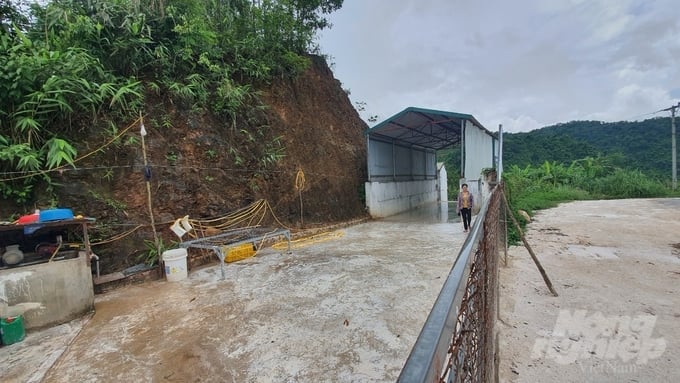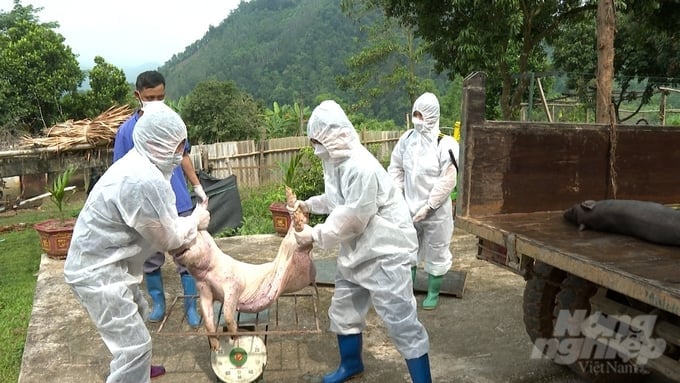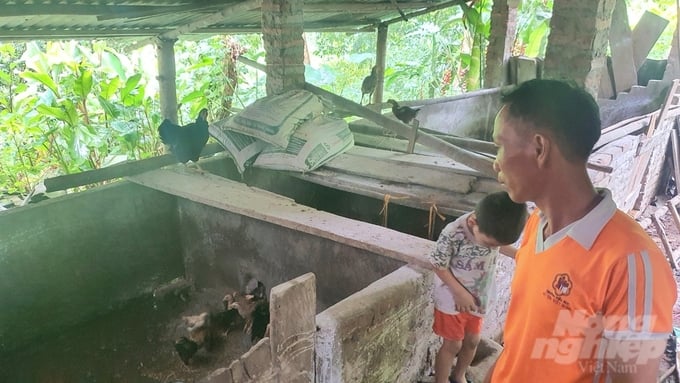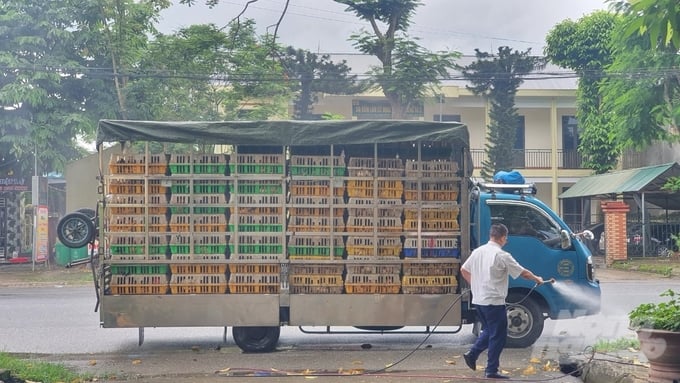May 30, 2025 | 10:36 GMT +7
May 30, 2025 | 10:36 GMT +7
Hotline: 0913.378.918
May 30, 2025 | 10:36 GMT +7
Hotline: 0913.378.918

A pig farming facility in My Thanh commune, Bach Thong district, locked and barred from outsiders during the outbreak. Photo: K.Trung.
African swine flu has reportedly affected the majority of small-scale pig herds in all communes across Bac Kan province. Consequently, many communes within the province are struggling without a pig herd due to death and culling. Several large-scale pig farms have successfully maintained their herds with effective disease control and quarantine measures.
My Thanh commune in Bach Thong district, is situated at the reservoir site of Thac Gieng hydropower plant on the Cau River. Commune Party Secretary Dinh Van Binh expressed his concerns: "Due to the commune's location blocking the river flow, My Thanh receives a significant number of livestock and poultry carcasses from upstream every year. This issue poses an additional concern for the local government during animal disease outbreaks, as it acts as a potential source of disease transmission."
The African swine fever outbreak has nearly eradicated the small-scale pig herds belonging to local farmers in My Thanh commune since the beginning of the year, with the most extensive damage recorded in April 2024. Subsequently, local veterinary officers collected samples for testing in May, and within two days, the results confirmed the presence of the disease. My Thanh was the first commune in Bach Thong district to declare an outbreak of African swine fever. It also housed the highest number of pigs culled due to the outbreak.
"Recent statistics indicate that the total number of pigs affected by African swine fever in the commune is 262, with a total weight of nearly 9.5 tons. The pigs belong to 84 households, with Phieng Kham hamlet being the most affected," reported Commune Party Secretary Dinh Van Binh.
My Thanh is the commune with the largest pig herd in Bach Thong district, with multiple households rearing pigs on a small scale. The commune also houses a concentrated livestock and poultry farming facility. The commune supports a livestock and poultry population of 21,136 animals, including 8,650 pigs, marking it as the district's primary pig farming region.
My Thanh reported a disease outbreak in 2023, affecting six out of its seven total hamlets (including Na Ca, Phieng Kham, Ban Chang, Ban Luong, Khau Ca, and Cay Thi), resulting in the disposal of over 3 tons of pigs (99 pigs in total), with 53 from a livestock breeding project.
My Thanh Commune People’s Committee has issued directives and guidelines on disease prevention and control measures for the local community. Additionally, the local People’s Committee assigned members of the disease prevention and control board to visit, monitor, and record all livestock and poultry populations across each hamlet.

Veterinary officers in Bac Kan province counting and examining pigs that died from the African swine fever before disposal. Photo: Ngoc Tu.
Trieu Phu Y, a farmer from My Thanh, manages one of the largest pig herd within the commune, witn two breeding sows and several pork pigs. His pig herd started exhibiting a loss of appetite in April. Shortly after, his two breeding sows succumbed to the disease and were subject to disposal. Trieu Phu Y's family is currently monitoring the health and growth of their three-month-old piglets.
"After receiving the positive test results for African swine fever, I bought vaccines for my piglets, with each dose costing 600,000 VND for 10 injections. Additionally, our family cleaned pig pens, applied lime powder, and sprayed chemical disinfectants according to guidelines and past experience," shared Trieu Phu Y.
Similarly, Trieu Van Ngoc, a farmer from Phieng Kham hamlet, owned a herd of three pork pigs in two separate pens, all recently culled to prevent the spread of the disease. When we arrived at his farm, both of the pig pens were still covered in lime powder.
"We are still hesitant to resume pig farming activities; we are waiting to see how to outbreak progresses. We would only consider resuming our operations after the outbreak has ended. For now, the empty pig pens are being used as a temporary enclosure for a few chickens," Ngoc's wife explained.

Many families in Bac Kan province are temporarily raising chickens while waiting for the end of the African swine fever outbreak. Photo: Kien Trung.
My Thanh is a predominantly agricultural commune with limited agricultural land, and livestock farming primarily serves as a supplemental income source. Notably, excess by-products and manure from the livestock farming activities are utilized for crop production. However, the poverty and near-poverty rates in the commune remains significant, reflecting its ongoing challenges. Amidst these challenges, the African swine fever outbreak has devastated the livestock farming households in My Thanh.
"Local farmers always strictly comply with the commune's disease prevention plan. Livestock owners with pigs that died from the disease have all promptly reported to local authorities for documentation. They are included in the official statistics, provided with disinfectants, lime powder, and other necessary supplies for pen sanitation, outbreak prevention, and compliance with regulations for the proper disposal of deceased animals," affirmed Commune Party Secretary Dinh Van Binh.
The impact of African swine fever extends beyond My Thanh; numerous communes across Bac Kan province are also grappling with its devastating effects. The majority of affected households have lost their livestock, which have been disposed of in accordance with regulations. Many communes now find themselves without any remaining pigs. When questioned, local leaders and residents shared a similar uncertainty towards the duration of the disease outbreak, emphasizing that "the disease will stop when all the pigs are dead."

Officers from a local animal quarantine station spraying disinfectant on vehicles used to transport livestock across the borders of Bac Kan province. Photo: K.Trung.
Dinh Van Huan, Vice Chairman of Hoa Muc Commune People’s Committee in Cho Moi district, reported that the commune officially declared an outbreak of African swine fever in May 2024. The disease was initially discovered in local pig herds towards the end of April, before spreading to the neighboring hamlets and villages. By early June, a total of 72 infected pigs, weighing over 3.6 tons, had been culled.
The latest report from Bac Kan province's Sub-Department of Livestock Production and Animal Health indicates that during the first six months of 2024, African swine fever affected 2,830 households, 598 hamlets, and 96 communes across eight districts and cities. The outbreak resulted in the death and disposal of 13,087 pigs, totaling 513,274 kilograms. To date, 10 communes have completed the mandatory 21-day monitoring period following the outbreak; 84 communes are undergoing the monitoring period, including 6 communes that experienced a second outbreak. Only two communes, Coc Dan and Bang Thanh, have officially declared the end of the outbreak.
"At this point, there are practically no pigs left in our commune. We have submitted a proposal to the district for the allocation of chemicals, lime powder for disinfection and sanitation of pig pens. Additionally, we advise residents to only resume pig farming activities after the outbreak has fully ended to avoid further financial losses," stated Vice Chairman Dinh Van Huan.
Translated by Nguyen Hai Long

(VAN) Ms. Nguyen Thi Dung, Deputy Director of Ngoc Hoang Cooperative, shared about the journey of bringing dragon fruit to Europe, achieving annual revenues in the billions of VND.

(VAN) Bamboo products from Thang Tho Bamboo Cooperative have reached many countries around the world, while also creating jobs for local workers.

(VAN) The Management Board of Con Dao National Park reported that a green sea turtle, tagged in the Philippines, has traveled thousands of kilometers to lay 84 eggs on Bay Canh Islet.

(VAN) Green technology is paving a new path for sustainable aquaculture in the Mekong Delta in particular and across the country in general, helping reduce emissions and adapt to climate change.

(VAN) On May 27, La French Tech Vietnam (the French startup and innovation community in Vietnam) held the French Tech Summit Vietnam 2025.
/2025/05/27/4731-2-223159_980.jpg)
(VAN) No votive paper, no styrofoam, no plastic bags, no plastic bottles, and no single-use plastic trays are the key rules tourists should keep in mind when visiting Con Dao.

(VAN) In the fight against plastic pollution, Vietnam has been demonstrating a proactive, pioneering, and active role in addressing the greatest environmental challenge today.